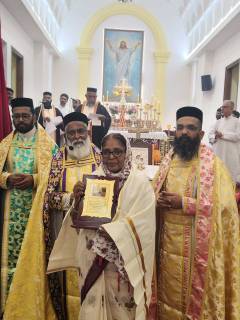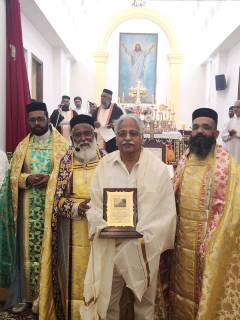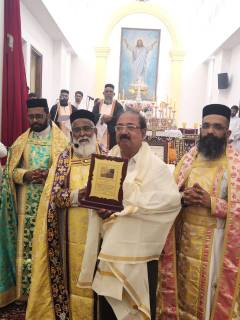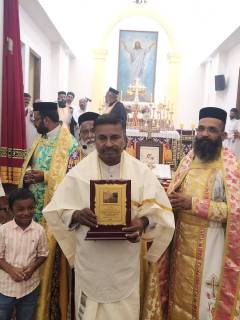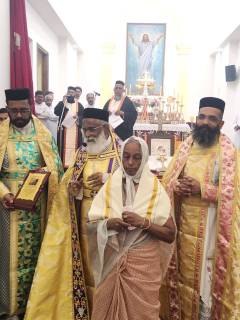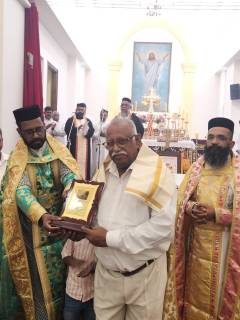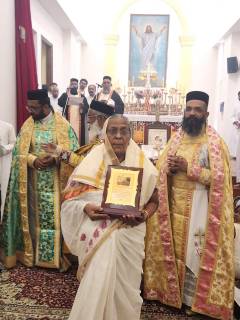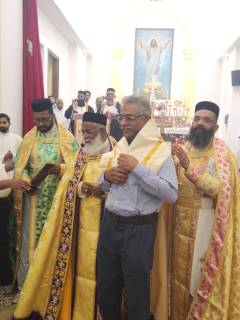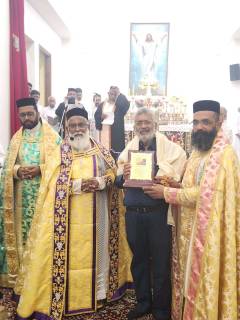St. Mary’s Orthodox Cathedral
Hauz Khas, New Delhi

Felicitating Senior Members who attained 70 years age
About Us
Major Spiritual Events
Events in November 2025
- There are no events scheduled during these dates.
Events in November 2025
- There are no events scheduled during these dates.
Our Shepherds

Rev. Fr. Shaji Mathews
Vicar

Rev. Fr. Ansal John
Asst. Vicar
Message of the Month
Dearly beloved
The mystery of salvation, as revealed in the life, death, and resurrection of Christ, finds luminous reflections in the lives of saints, especially in the Dormition of the Theotokos (St. Mary) and the Feast of Transfiguration. These feasts, celebrated in August by the Holy Church, are not merely commemorations of past events—they are profound revelations of our destiny: transformation leading to eternal life.
The Dormition of St. Mary, celebrated on August 15, is not portrayed by the Church as a sorrowful end but as a glorious passage into life eternal. Mary, the Mother of God, having fully united herself to the will of God, underwent a “falling asleep” (koimesis), not a death marked by decay or defeat. Tradition holds that her body was taken to heaven, as a foretaste of the resurrection promised to all the faithful. St. John of Damascus beautifully writes: “It was fitting that she who had kept her virginity intact in childbirth should keep her body incorrupt even after death.”
Mary’s life was a continual transformation, from a humble handmaid to the Queen of Heaven. She embodied obedience and contemplation, nurturing the Word made flesh in her womb and in her heart. Her Dormition is a beacon of hope, reminding us that life in Christ overcomes death.
Just days before the Dormition, on August 6, the Church celebrates the Transfiguration of Christ on Mount Tabor. There, the divine light shone from Christ as He revealed His true nature to Peter, James, and John. Moses and Elijah appeared, representing the Law and the Prophets, confirming Christ as the fulfillment of both. The Transfiguration is not only a Christological event but also an anthropological prophecy—revealing what humanity is meant to become in union with God. St. Gregory Palamas emphasized that the light on Tabor was not a created light, but the uncreated energy of God. He wrote:
“God is light, and those deemed worthy to see Him see Him as light.”
In beholding Christ transfigured, the disciples received a vision of the end goal: deification (theosis)—the transformation of human nature by divine grace. It is this same transformation that awaited Mary in her Dormition and awaits all who abide in Christ.
The early Church Fathers consistently taught that salvation is not merely juridical or external but a deep, inward transformation of the whole person. St. Irenaeus of Lyons, writing in the 2nd century, declared:
“The glory of God is a human being fully alive; and the life of man is the vision of God.”
This vision—union with God—is the telos of human existence. St. Athanasius famously stated:
“God became man so that man might become god.”
This transformative vision echoes in the lives of the Desert Fathers, in the mystical theology of St. Ephrem the Syrian, and in the homilies of St. Cyril of Alexandria. They saw in Mary the perfect example of what it means to be “transformed by the renewal of your mind” (Romans 12:2).
As we journey through the Fast of the Dormition and celebrate these feasts, the Church invites us to enter into the mystery of transformation. Through prayer, fasting, the sacraments, and contemplation, we too are called to ascend Mount Tabor and to fall asleep in peace like the Theotokos, with full hope in the resurrection. Transformation is not a one-time event. It is a continual, grace-filled process that begins now and culminates in eternal life. The lives of the early saints and the feasts of our Lord and His Mother teach us this truth: Salvation is not escape from the body but its glorification; not the end of life, but its transfiguration.
Let us, like Mary, say, “Be it unto me according to Your word”, and walk the path of transformation that leads to salvation through eternal life.
Yours in His Service
Fr. Ansal John
(Asst. Vicar)
UPCOMING EVENTS

31 Aug
Sunday
Sunday School: Unit Level Cultural Competition
MGOCSM: Olive
Ada Pradhaman Sale














